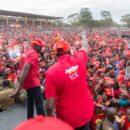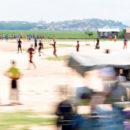Debating Ideas is a new section that aims to reflect the values and editorial ethos of the African Arguments book series, publishing engaged, often radical, scholarship, original and activist writing from within the African continent and beyond. It will offer debates and engagements, contexts and controversies, and reviews and responses flowing from the African Arguments books.

Mural in Khartoum, Sudan post the revolution depicting communal drawings of peace, justice and democracy. Credit: Raga Makawi
In any society, peace serves as a catalyst for national and individual transformation and progress. With it comes a more equitable distribution of power and resources, justice, reconciliation, healing and finally opportunities for growth and development. No other region in Africa has been marred with protracted conflict in the same way as the Horn of Africa region has. Each country in this volatile region has endured, or is experiencing, war and its consequences. Each country has at minimum one or two peace agreements within or beyond its borders, yet these agreements have not borne the kind of transformation that peace promises. In fact, what jointly characterizes countries in the Horn are: unimplemented peace agreements, high numbers of unaddressed human rights violations, poverty, high rates of youth unemployment, radicalization, unrest and fragile political transitions. Recent geo-politics related to Red Sea and Nile River negotiations also impacts or puts at risk the full realization of peace in the region.
In order to shift the current trend, policymakers in the Horn need to develop a joint monitoring mechanism that can be adopted and shared by governments in order to hold signatories to peace agreements accountable for the full implementation of agreements and to allow the African Union (AU) to enforce punitive measures for failures to comply. Policymakers should also encourage donors and AU member states to channel funds through the AU Peace Fund, not only to support peace operations but also to be able to fully finance mediation and preventative diplomacy efforts. Last but not least, interventions to resolve conflict in the countries of the Horn must be tailor-made to the historical, cultural, religious and political context at hand, in order to develop best practices that work for nations in the Horn.
Listen to Yodit Leema’s short audio file with recommendations to policymakers on the possibilities and limitations of achieving peace in the Horn of Africa:






